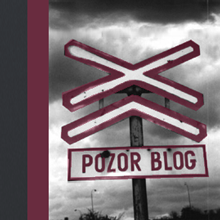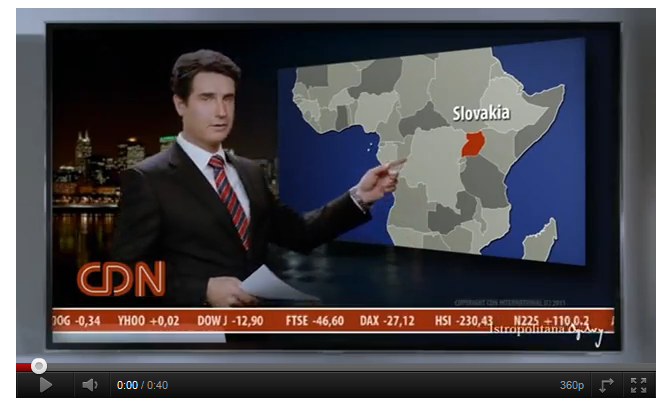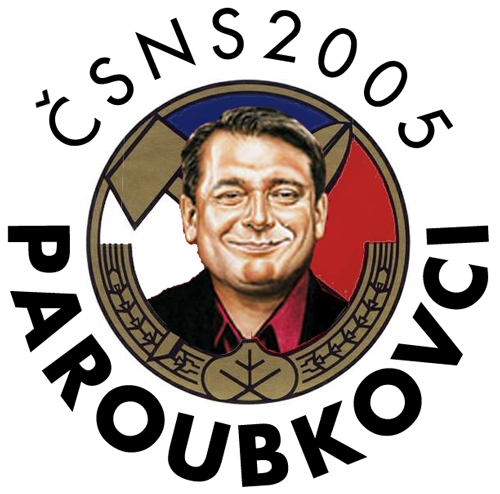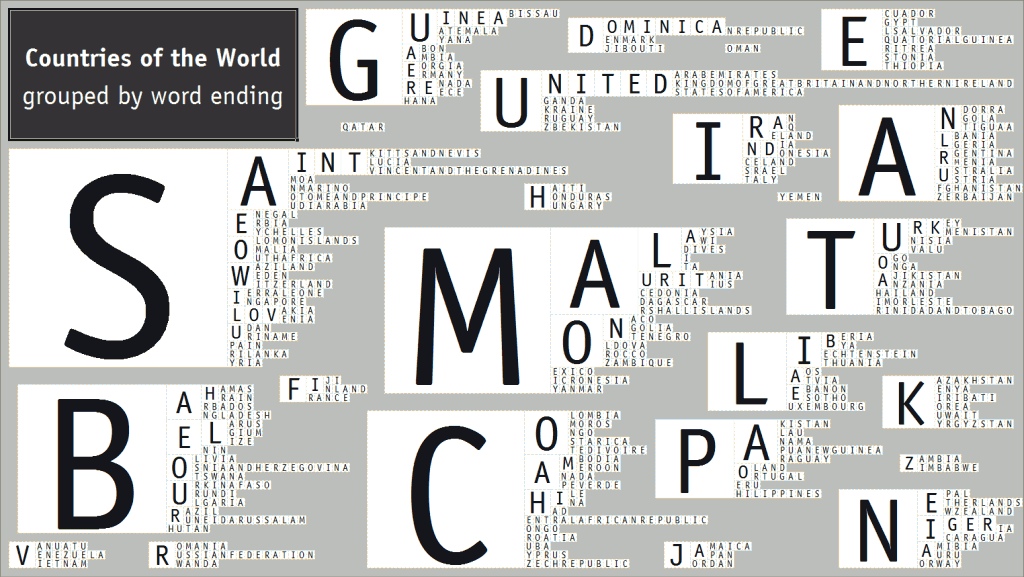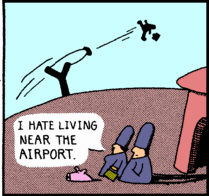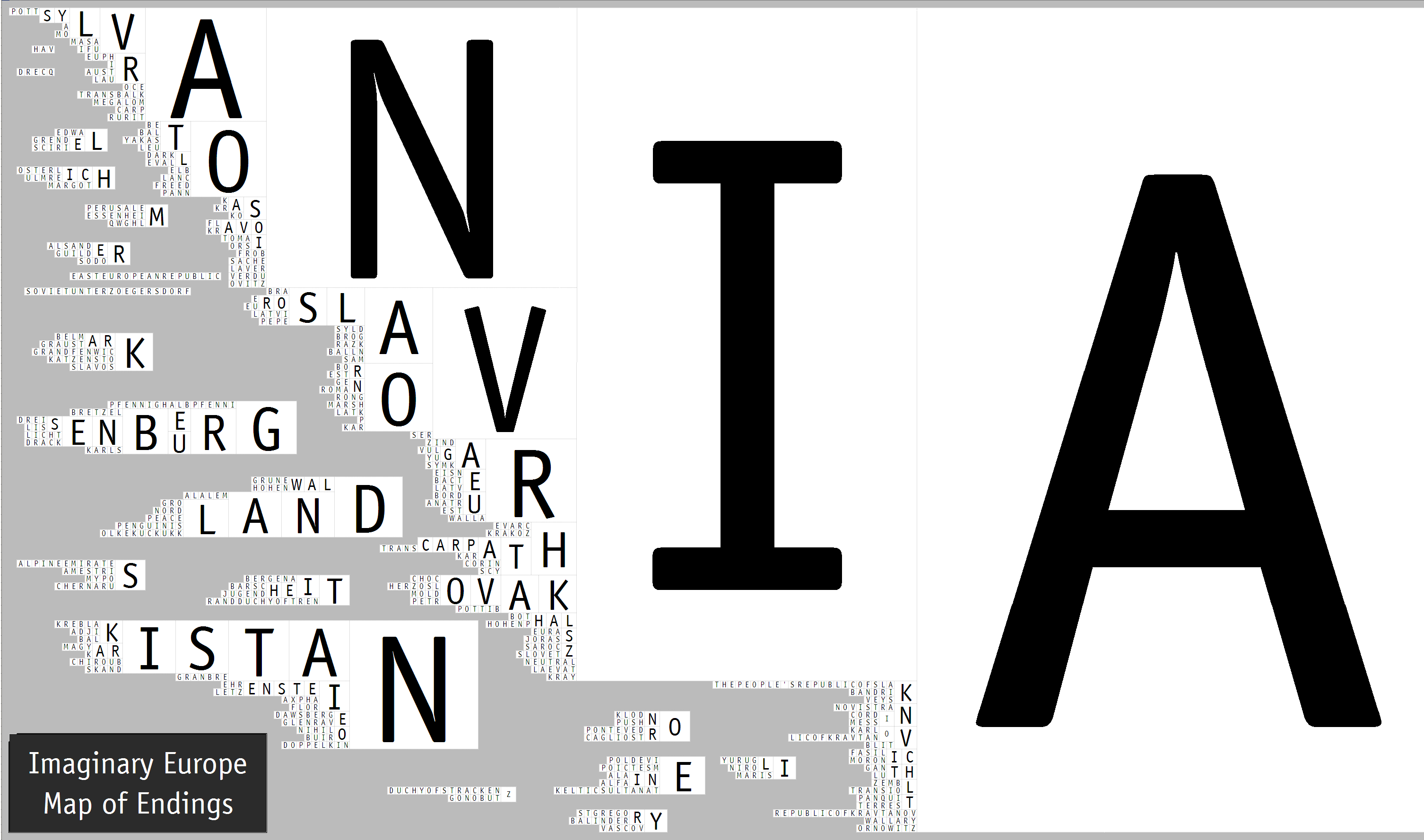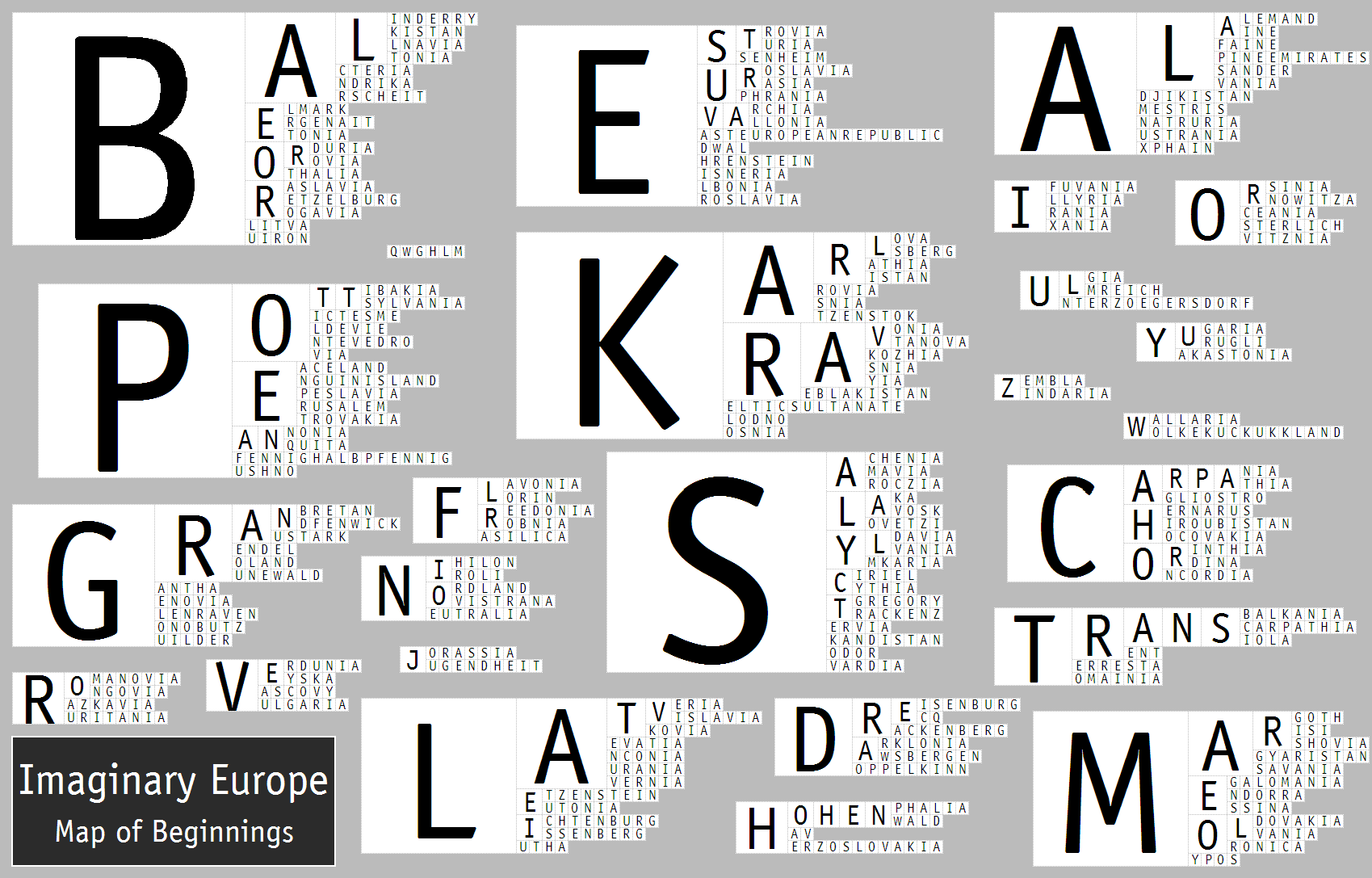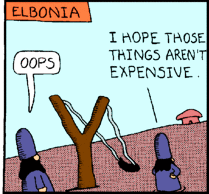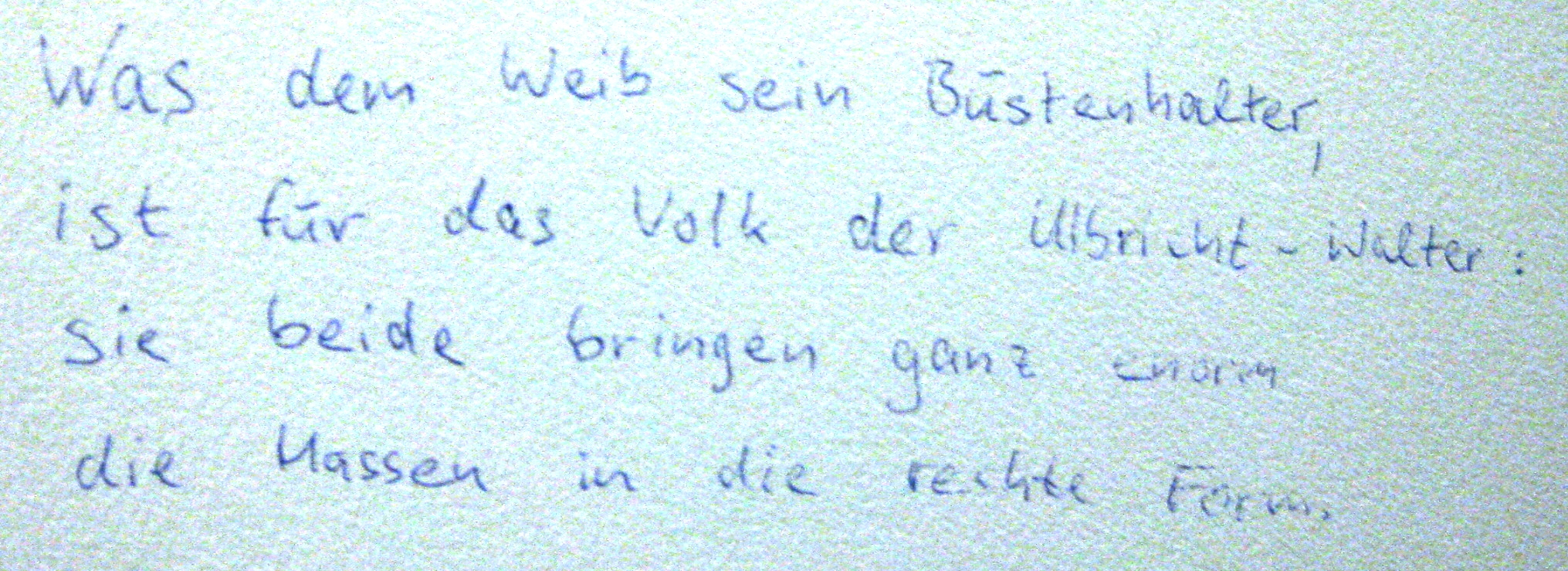 I am, I must admit, a latecomer to the Eurovision Song Contest, aving not I discovered until 2007 when I was forced into a head-on confrontation when it(or at least the outdoor portions of it )happened right next to the Joint Sessions of the European Consortium for Political Research. But once I saw it, I couldn’t quite look away, and it has become an annual fascination for me (and now for my entire family). Recently these two worlds collided again and I realized that the weird names of new parties would fit very nicely into the song contest–and vice versa. They are so similar, in fact, that I am dare the people of the internet to try to figure out which is which. And so in the spirit of the recent “IKEA or Death”, I’ve developed (with the enormous help of Graham Hukill in my university’s Office of Teaching and Learning) a little game called: Party or Popsong. Can you tell the difference?
I am, I must admit, a latecomer to the Eurovision Song Contest, aving not I discovered until 2007 when I was forced into a head-on confrontation when it(or at least the outdoor portions of it )happened right next to the Joint Sessions of the European Consortium for Political Research. But once I saw it, I couldn’t quite look away, and it has become an annual fascination for me (and now for my entire family). Recently these two worlds collided again and I realized that the weird names of new parties would fit very nicely into the song contest–and vice versa. They are so similar, in fact, that I am dare the people of the internet to try to figure out which is which. And so in the spirit of the recent “IKEA or Death”, I’ve developed (with the enormous help of Graham Hukill in my university’s Office of Teaching and Learning) a little game called: Party or Popsong. Can you tell the difference?
http://www.pozorblog.com/party_or_popsong/. So let the voting begin!
Category: jokes
Euroblindness 2012
Thanks to the 44 Americans (and one Pole) who deliciously crowded my house on Saturday for a taste of Eurovision and donated to our local library. Although we did not keep score as rigorously as in the past, Russia’s Grandmothers from Buranovo were the big winners in the house, though there was also some grudging acknowledgment of Serbia, Sweden, Albania, Malta and Cyprus and widespread incredulity at Ireland and Turkey.
The most skepticism, however, was reserved for the between-song cut pieces which, unlike the past several years, made no reference at all to the country performing (except in the rather clever lighting of the performance hall) and instead focused on beautiful but ultimate quite repetitive images of Azerbaijan’s scenic highlights (the Maiden tower, horses, the flaming skyscrapers). Nor did were they stirred by the segement titles such as “Azerbaijan: Living in Movement”, “Azerbaijan: Horsemen Land”, “Azerbaijan: Land of Carpets” or the lovely oxymoron, “Azerbaijan, Land of Water.” One guest suggested the image of TV writers sitting around a table brainstorming: ok, Land of Oil, Water, Fire, Snow, Horses, great. Only 17 more to go. And then we had suggestions:
- Azerbaijan, Land of Land
- Azerbaijan, Land of Phallic Monuments
- Azerbaijan, Land of Soil
- Azerbaijan, Land Partially Controlled by Another Land
- Azerbaijan, Land of Heavy Machinery Production
- Azerbaijan, Land of Political Prisoners
We observed, too, that there was no cutting to any public gathering of locals watching in the main square (too risky?) and there was praise for the oblique comments of German score-announcer Anka Engelke about the joys of democracy. If America could participate (my 6-year-old predicts Eurovision will come to Lansing, Michigan in 2029, we just might see a Fox news score announcer taking Sweden to task next year for the bad example set by its welfare state.
Eurovision 2012: What’s in a title?
It’s that time again. European readers do not need any additional information, but Americans, especially my local neighbors, still need to know why they should become obsessed (or at least interested) with the Eurovision Song Contest.
Exhibit A. Last year’s entry from Moldova: three foot conical hats, unicycles, monocles, and intercontinental ballistic gnomes. It is impossible to ask for more. Few of the other acts were as consciously absurd, but unconscious absurdity is almost as good, and between absurdity and breathtaking emptiness (like last year’s winner), Eurovision is a damn fine show.
Exhibit B. The list of artists for 2012. It’s very hard not to want to watch a musical show with artists such as
- Rambo Amadeus,
- Sinplus,
- Compact Disco,
- Trackshittaz,
- Jedward,
- Litesound, and …
- Engelbert Humperdinck (yes, the Englebert Humperdinck, of “After the Lovin” fame).
Exhibit C. The song titles (and hopefully the songs themselves) occupy the full spectrum from banal to ridiculous. Imagine the insights into human love and life that must be contained in songs such as
- You and Me,
- Echo (You and I),
- Black and White,
- The Sound Of Our Heart
But there are also some on the inexplicable side like
- Euro-Neuro,
- Woki mit deim Popo
Others opt for the full sentence approach. Together these tell a story (though not a good one).
- Would You. Be My Guest. I Believe. Love Will Set You Free. Isn’t Love Something? These Steps I Know. This Is The Night. We Are The Heroes.
Of course it’s hard to take this too seriously since another song title insists
- I’m a Joker.
Another set of songs appear to identify things you will not get during the 3 hours spent watching this competition (or might actually end up losing):
- Beautiful Song, Euphoria, Aphrodisiac, Heaven, Party For Everybody, My Life, La La Love, Love Unlimited, Time.
And some of the entries read like pleas to viewers to reject and keep watching despite their natural inclinations:
- Stay, Stay with me, Don’t Close Your Eyes, Listen, Love Me Back, Love Is Blind [and, with any luck, deaf].
And there are other songs that appear to describe how viewers actually feel:
- Standing Still, Out Of Love, When I Blunder, Oh Oh-Uh-Oh Oh (The Social Network Song). Never Forget.
Perhaps the best advice about watching the show, given in retrospect, is that of Denmark’s Soluna Samay’s:
- Should’ve Known Better.
Fittingly, the best description of the show overall—at least the ten years of it that I’ve now seen—is that of defending champion, Azerbajan, whose entry Sabina Babayeva has will be singing a song called:
- When The Music Dies.
And that’s why anybody who lives in the Detroit metropolitan area should show up at my house on Saturday the 26th to watch: http://www.facebook.com/events/435204703156449/
National Identity and Beer Advertisements
![]() he New York Times broke tradition yesterday and published an article about Slovakia without a picture of a horse and cart:
he New York Times broke tradition yesterday and published an article about Slovakia without a picture of a horse and cart:
| A history of Slovakia according to The New York Times | |
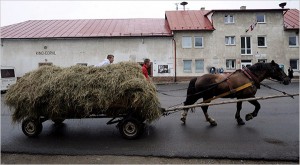 |
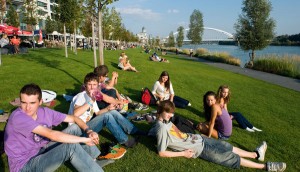 |
| Slovakia 2009 | Slovakia 2011 |
The article in question starts with a nice reference to a recent ad for Zlaty Bazant which contains the line “Wanting to borrow from everybody? That’s Greek. Not wanting to lend to Greeks? that’s Slovak” and becomes a symbol in the article for Slovakia’s reluctance to participate in the bailout as well as a generally skeptical attitude toward broader Euro and European structures (though the NYT piece mistakenly cites the ad as saying “not wanting to lend to anybody” as opposed just to “not wanting to lend to Greeks”).
 
What the Times article doesn’t say is that the ad begins with another national critique, that is in some ways even more pointed:
Not knowing where Slovakia is?That’s American.
Versions here http://www.youtube.com/watch?v=gIr7jMDKw-k
and http://www.youtube.com/watch?v=jDaCiGF8wRw
I have to give the ad producers credit for giving the actor great news anchor hair, and it is hard to take issue with the critique given the record of major American news outlets. A few examples (click to enlarge):
Fortunately for my tender national sentiments, Americans are not the only ones to come under fire. Czechs get it too:
Having a thousand in your pocket and acting as if you have two, that’s Czech. Having two in your pocket and acting like you have a thousand? That’s Slovak.
Nearly everybody else gets it as well:
Marrying a Slovak woman? That’s English, Italian, Austrian, UAE. Marrying a Slovak man? That’s Slovak.
Germans come off as organized but uptight and French cuisine is odd and skimpy while Slovaks have big appetites for unhealthy food and can find things even on a messy desk. What is most interesting to me here is the notion of Slovak self-identity that is portrayed here: disorganized and sloppy but clever and generous. It’s actually interesting that this is not all that different from Czech self-identity in the face of the Austrians in The Good Soldier Svejk.
And speaking of beer-related identity discussions, it is notable how much the Bazant ad has in common with its counterpart the “I am Canadian” ad produced by Molson a decade ago, which likewise pokes fun at the arrogance of larger countries while expressing a bit of (self-deprecatory) hometown pride. Do other countries produce similarly national beer ads? Do tell.
Party Personal-ism
I didn’t think that I would need to be the one to do this, but somebody needs to do make a visual comment on what passes for party building on the Czech left. So I guess it’s up to me and Adobe Photoshop.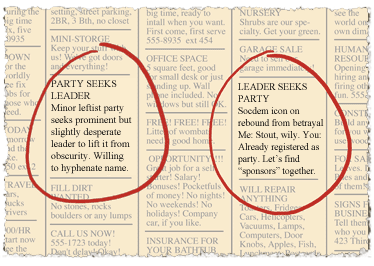
We saw this kind of love story in 2010, the two partners coming ever so close to the threshold:

In the same election we saw also saw the similar, if more convoluted story of Jana Bobosikova, late of the Independent Democrats, then Politics 21, then presidential candidate of the Communist Party, then, in partnership with the Party of Common Sense, “Sovereignty-the Bloc of Jana Bobosikova, Party of Common Sense”, and finally “Sovereignty-The Bloc of Jana Bobosikova”
Now it’s 2011 and time for another sequel, whose plot is nicely laid out in MF Dnes:
Paroubek vzdal kandidaturu na Hrad. Blíží se politický přestup roku.
But this effort needs a logo. Once again through the power of Photoshop, I offer:
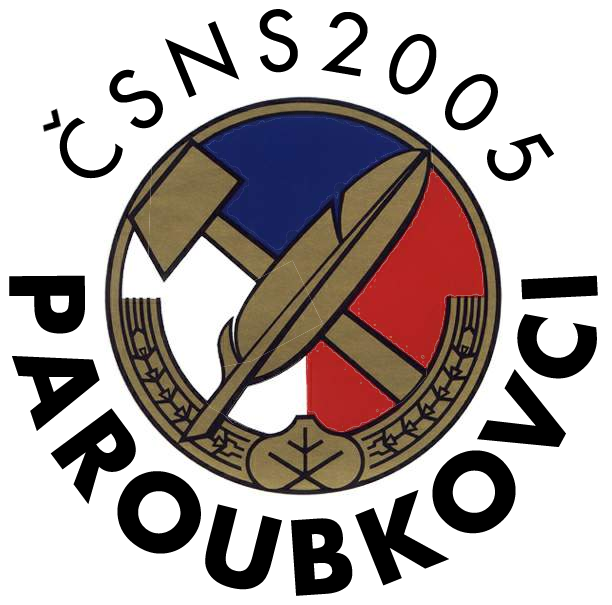 Yes, it’s Zemovci II: Paroubkovci. If that’s not quite clear enough,
Yes, it’s Zemovci II: Paroubkovci. If that’s not quite clear enough,
there is room in the logo for some helpful supplementary imagery.
4.32% here we come!
Make your own country name, part II. This time with real countries
This is the way the world ends, not with a b-a-n-g but with an -n-i-a.
At least that’s the way a good share of the world’s country names end. Having used fictional country data to make “maps” of the beginnings and endings of non-existent countries, it was an obvious next step to try it with the real world. So as with Ballnavia and Slaka and Molvania, I inverted the names on the United Nations member list (English-language version) and alphabetized by last letter and then arrayed them graphically with size representing frequency (actually it represents frequency squared, but I think that actually helps draw out the patterns). What I got was actually not much different from the results for make-believe Europe:
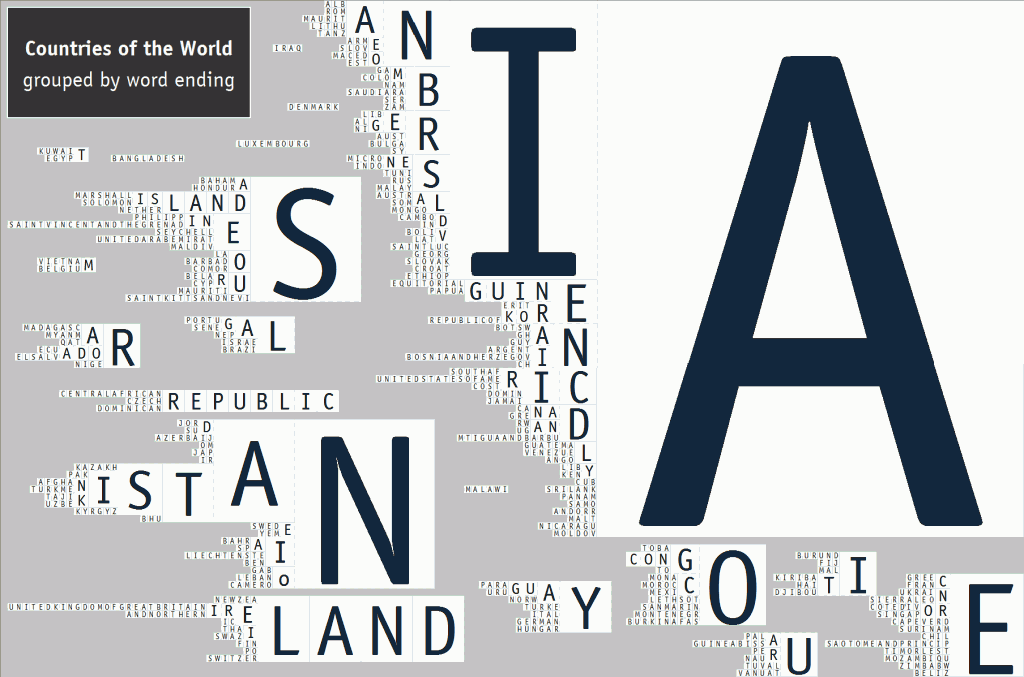
I did the same with a normal forward-facing alphabetization. and again got a similar result, again suggesting that country beginnings are the source of much more variety than country endings.
So from here it’s a simple step to yet another matrix of beginnings and endings, again ranked by my formula of “length of character string” times “frequency of appearance.” Draw lines from prefix to suffix to make your own country names. Add letters in between to increase the excitement:
| Pts. | # | Prefix | <————-> | Suffix | # | Pts. |
| 20 | 10 | MA | IA | 37 | 74 | |
| 18 | 3 | UNITED | LAND | 9 | 36 | |
| 16 | 2 | DOMINICA | STAN | 7 | 28 | |
| 15 | 3 | SAINT | NIA | 9 | 27 | |
| 15 | 5 | MAL | ISTAN | 5 | 25 | |
| 12 | 2 | GUINEA | REPUBLIC | 3 | 24 | |
| 10 | 2 | NIGER | TAN | 8 | 24 | |
| 10 | 5 | CO | ANIA | 5 | 20 | |
| 10 | 5 | MO | GUINEA | 3 | 18 | |
| 10 | 5 | PA | KISTAN | 3 | 18 | |
| 9 | 3 | BEL | ELAND | 3 | 18 | |
| 9 | 3 | MON | LANDS | 3 | 15 | |
| 8 | 2 | MALA | ICA | 5 | 15 | |
| 8 | 2 | SLOV | RICA | 3 | 12 | |
| 8 | 2 | TURK | MBIA | 3 | 12 | |
| 8 | 4 | CA | ERIA | 3 | 12 | |
| 6 | 2 | BAH | SIA | 4 | 12 | |
| 6 | 2 | CHI | KOREA | 2 | 10 | |
| 6 | 2 | GRE | NESIA | 2 | 10 | |
| 6 | 2 | IRA | ILAND | 2 | 10 | |
| 6 | 2 | IND | CONGO | 2 | 10 | |
| 6 | 2 | LIB | ES | 5 | 10 | |
| 6 | 3 | AN | ANA | 3 | 9 | |
| 6 | 3 | BO | INA | 3 | 9 | |
| 6 | 3 | BU | NADA | 2 | 8 | |
| 6 | 3 | NE | ANDA | 2 | 8 | |
| 6 | 3 | SE | ALIA | 2 | 8 | |
| 6 | 3 | SO | ENIA | 2 | 8 | |
| 6 | 3 | SW | ONIA | 2 | 8 | |
| 4 | 2 | AL | GUAY | 2 | 8 | |
| 4 | 2 | AR | DIA | 2 | 6 | |
| 4 | 2 | AU | VIA | 2 | 6 | |
| 4 | 2 | BR | DAN | 2 | 6 | |
| 4 | 2 | FI | AIN | 2 | 6 | |
| 4 | 2 | GA | DOR | 2 | 6 | |
| 4 | 2 | GE | LA | 3 | 6 | |
| 4 | 2 | JA | TI | 3 | 6 | |
| 4 | 2 | LA | AL | 3 | 6 | |
| 4 | 2 | LE | CO | 3 | 6 | |
| 4 | 2 | NA | AR | 3 | 6 | |
| 4 | 2 | PO | OS | 3 | 6 | |
| 4 | 2 | SI | US | 3 | 6 | |
| 4 | 2 | SU | YA | 2 | 4 | |
| 4 | 2 | TO | CE | 2 | 4 | |
| 4 | 2 | TA | EN | 2 | 4 | |
| AS | 2 | 4 | ||||
| AU | 2 | 4 |
And what can we take from this? Well, if you’re a serious, reality-minded person, not much. But if you like to make stuff up and tell stories and have fun with words, then you get some great new opportunities to create things that sound like countries but really aren’t. Below, in alphabetical order, because I can’t pick a favorite, is a partial list of some of the possibilities. Some are just variations on existing country names with the right amount of detail in the prefix: Malistan and Malaguay sound about right, with the right number of syllables and are enriched by the common prefix “Mal”–with its ominous undertones in Latin and its implication of smallness in Slavic languages). Mondor, too, sounds sinister, though not quite as bad as its its Middle-Earth counterparts.
Among the others, I like the triple combination of Tailand, Toeland and Toiland (somewhere between Santa’s workshop and the nearby WC). Two others–Monica and Nadia–highlight the similarity between country names and Indo-European names for females. Panada and Swina sound vaguely like animals. Many sound like serious medical conditions, especially Annesia, Mania, Maleria and Maladia. And there are some that end in the “ya” sound, and begin with verb-sounding prefixes. Tasia sounds like “Tase ya” (no place for Andrew Meyer) and the same possibilities apply to Suya (a response, perhaps, to Tasia), to Bombia, and, somewhat less belligerently, to Combia and Boeria. And one of the really nice things about the list is that contains at least two “real” fake countries: Sodor, far more real to most 4-year-old Thomas the Tank Engine fans than the country in which they actually live, and Catan, equally real to many players of German-style board games. So, to would-be game designers, authors of children’s stories, and all those others who want to see their name in lights, I say use the chart. Neonia is within reach.
- ANANA
- ANNESIA
- BOMBIA
- CATAN
- COMBIA
- COSIA
- FINESIA
- IRAMBIA
- MALADIA
- MALAGUAY
- MALERIA
- MALISTAN
- MANIA
- MONDOR
- MONICA
- NADIA
- NEONIA
- PANADA
- SAINT REPUBLIC
- SODOR
- SUYA
- SWINA
- TAILAND
- TASIA
- TOELAND
- TOILAND
- UNITEDLAND


P.S. It’s hard for me not to notice that Sodor Railways logo on the Wikipedia page, while obviously lovingly crafted by a fan with strong graphics skills also bears a striking and unfortunate resemblance to another not too different insignia with a black squiggly line inside white circle on a dark red field. As Marta von Trapp wisely observes in The Sound of Music, “Maybe the flag with the black spider makes people nervous!”
A map of non-existent European countries (and how to create your own)
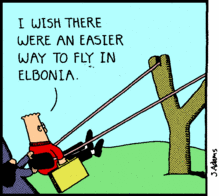 Earlier this year I decided to leave Elbonia. Elbonia served me well during over a decade of exams about hypothetical Eastern European countries that allowed me to test whether my students could apply their abstract knowledge to new and unfamiliar cases. But after a decade of references to the Dilbert cartoons in which I first encountered it, Elbonia began to feel as stale as Dilbert itself. And since I did not want simply to switch to another cliche like “Vulgaria” or “Ruritania,” I did a search for a list of “fictional European countries” and immediately found a wikipedia page that I didn’t expect to exist: List of Fictional Countries and an even more specific List of Fictional European Countries.
Earlier this year I decided to leave Elbonia. Elbonia served me well during over a decade of exams about hypothetical Eastern European countries that allowed me to test whether my students could apply their abstract knowledge to new and unfamiliar cases. But after a decade of references to the Dilbert cartoons in which I first encountered it, Elbonia began to feel as stale as Dilbert itself. And since I did not want simply to switch to another cliche like “Vulgaria” or “Ruritania,” I did a search for a list of “fictional European countries” and immediately found a wikipedia page that I didn’t expect to exist: List of Fictional Countries and an even more specific List of Fictional European Countries.
And with this raw material, I could not help but take this one step further and to look for some underlying patterns that might even allow me to create new ones. It wasn’t much of a problem to look for common beginnings by alphabetizing the list. It was slightly more complicated to find common endings by alphabetizing from the last letter forward, but some playing with Excel took care of that. These lists were not as useful as I had hoped, however, because many countries many ended in A, many of those in -I-A and many of those in -V-I-A. How to find the patterns? The answer I came up with was to display these graphically, with letter sequences according to first and last letter and letter size according to frequency, sort of a wordcloud but accounting for the proximity of related characters. (There’s probably some name and algorithm for this. I usually end up reinventing the wheel).
Since the letter sequence took up less space when positioned next to one another than in a long list—and since the resulting arrangement had a topographical look, it was almost natural to actually turn the list into something maplike. And that is what I eventually did and what I present below: a map-like array of imaginary European country names according to beginnings and endings.
And the same array that produced this map can be also used for my initial goal: the creation of new names. For no reason other than that it seemed right, I weighed each ending by the multiple of its frequency and its length. This means that very simple beginnings and endings, like “A” have a high frequency score discounted by short length, while much longer (and more interesting) names, like “I-S-T-A-N” are discounted by their relative rarity. The result is the list below or in a pdf worksheet here: Imaginary Europe Matrix
| Pts. | # | Prefix | <————> | Suffix | # | Pts. | ||
| 15 | 5 | KAR | IA | 92 | 184 | |||
| 15 | 5 | KRA | NIA | 38 | 114 | |||
| 15 | 3 | TRANS | VIA | 20 | 60 | |||
| 12 | 4 | BAL | ONIA | 12 | 48 | |||
| 12 | 6 | PO | AVIA | 10 | 40 | |||
| 10 | 5 | PE | OVIA | 9 | 36 | |||
| 10 | 5 | MA | ISTAN | 7 | 35 | |||
| 10 | 2 | HOHEN | RIA | 11 | 33 | |||
| 10 | 2 | CARPA | VANIA | 6 | 30 | |||
| 9 | 3 | LAT | SLAVIA | 5 | 30 | |||
| 9 | 3 | MAR | LVANIA | 4 | 24 | |||
| 8 | 2 | POTT | OVAKIA | 4 | 24 | |||
| 8 | 2 | GRAN | ARIA | 5 | 20 | |||
| 8 | 2 | KARL | LAND | 5 | 20 | |||
| 8 | 2 | KRAV | RANIA | 4 | 20 | |||
| 6 | 3 | BE | TONIA | 4 | 20 | |||
| 6 | 2 | BOR | HIA | 6 | 18 | |||
| 6 | 3 | BR | CARPATHIA | 2 | 18 | |||
| 6 | 3 | ME | KISTAN | 3 | 18 | |||
| 6 | 2 | MOL | SYLVANIA | 2 | 16 | |||
| 6 | 3 | SA | ROSLAVIA | 2 | 16 | |||
| 6 | 2 | SLA | ROVIA | 3 | 15 | |||
| 6 | 2 | SYL | KIA | 5 | 15 | |||
| 6 | 2 | DRE | ARISTAN | 2 | 14 | |||
| 6 | 3 | CH | ERIA | 3 | 12 | |||
| 6 | 2 | COR | URIA | 3 | 12 | |||
| 6 | 2 | ALA | BERG | 3 | 12 | |||
| 6 | 2 | EST | NOVIA | 2 | 10 | |||
| 6 | 2 | EUR | GARIA | 2 | 10 | |||
| 6 | 2 | EVA | HALIA | 2 | 10 | |||
| 6 | 2 | RO | HEIT | 2 | 8 | |||
| 6 | 2 | VE | WALD | 2 | 8 | |||
| 6 | 2 | NI | INIA | 2 | 8 | |||
| 4 | 2 | RO | IN | 4 | 8 | |||
| 4 | 2 | VE | KA | 3 | 6 | |||
| 4 | 2 | NI | SIA | 2 | 6 | |||
| 4 | 2 | NO | ZIA | 2 | 6 | |||
| 4 | 2 | LE | INA | 2 | 6 | |||
| 4 | 2 | LI | OVA | 2 | 6 | |||
| 4 | 2 | SC | ICA | 2 | 6 | |||
| 4 | 2 | ST | THA | 2 | 6 | |||
| 4 | 2 | FL | INE | 2 | 6 | |||
| 4 | 2 | FR | ICH | 2 | 6 | |||
| 4 | 2 | DA | ARK | 2 | 6 | |||
| 4 | 2 | YU | LI | 2 | 4 | |||
| 4 | 2 | UL | NO | 2 | 4 | |||
| 4 | 2 | OR | RO | 2 | 4 |
From this list it’s possible to connect the beginnings and endings to create new names. Below are just 60 of the 2500 names you can create this way, some quite plausible, others just fun to roll of the tongue. My favorites so far? I like Beria, but it’s already been taken by a historical figure. Balonia is pretty tempting. Drekia and Drearia are a pretty good pair (that probably would get mixed up like Slovenia and Slovakia). Euroslavia and Euristan form nice juxtapositions. Cornia and Krania are nicely corporeal. Krakistan and Peroslavia are also somehow evocative. Right up there is Evakistan (which includes in its name the suggestion of hurried departure), but the best, I think, is Betonia, which captures the experience of concrete tower-block suburbs better than anything else I have seen. So next year I’ll set my students to write the history of Betonia. Perhaps they’ll have to deal with an Elbonian invasion.
- ALATONIA
- BALERIA
- BALONIA
- BALTONIA
- BERIA
- BEROVIA
- BETONIA
- BORROSLAVIA
- BRAKISTAN
- BRAVIA
- CARPACARPATHIA
- CARPAGARIA
- CARPARIA
- CHARIA
- CORKISTAN
- CORNIA
- DREARIA
- DREKIA
- DRETONIA
- DREVIA
- ESTRIA
- ESTROSLAVIA
- EURANIA
- EURISTAN
- EUROSLAVIA
- EURURIA
- EVAKISTAN
- GRANGARIA
- GRANISTAN
- HOHENHEIT
- KARENIA
- KARGARIA
- KARISTAN
- KARKISTAN
- KARLOVAKIA
- KARLTONIA
- KRAKISTAN
- KRANIA
- KRATONIA
- LATHIA
- MANOVIA
- MARANIA
- MARONIA
- MARROSLAVIA
- MENIA
- METONIA
- MOLTONIA
- PEKISTAN
- PEROSLAVIA
- PONIA
- POTTLAND
- POTTURIA
- SATONIA
- SLANOVIA
- SLARANIA
- SLATONIA
- SLAVANIA
- SYLIA
- SYLKISTAN
- SYLSYLVANIA
- TRANSISTAN
- TRANSOVAKIA
| ALATONIA |
| BALERIA |
| BALONIA |
| BALTONIA |
| BERIA |
| BEROVIA |
| BETONIA |
| BORROSLAVIA |
| BRAKISTAN |
| BRAVIA |
| CARPACARPATHIA |
| CARPAGARIA |
| CARPARIA |
| CHARIA |
| CORKISTAN |
| CORNIA |
| DREARIA |
| DREKIA |
| DRETONIA |
| DREVIA |
| ESTRIA |
| ESTROSLAVIA |
| EURANIA |
| EURISTAN |
| EUROSLAVIA |
| EURURIA |
| EVAKISTAN |
| GRANGARIA |
| GRANISTAN |
| HOHENHEIT |
| KARENIA |
| KARGARIA |
| KARISTAN |
| KARKISTAN |
| KARLOVAKIA |
| KARLTONIA |
| KRAKISTAN |
| KRANIA |
| KRATONIA |
| LATHIA |
| MANOVIA |
| MARANIA |
| MARONIA |
| MARROSLAVIA |
| MENIA |
| METONIA |
| MOLTONIA |
| PEKISTAN |
| PEROSLAVIA |
| PONIA |
| POTTLAND |
| POTTURIA |
| SATONIA |
| SLANOVIA |
| SLARANIA |
| SLATONIA |
| SLAVANIA |
| SYLIA |
| SYLKISTAN |
| SYLSYLVANIA |
| TRANSISTAN |
| TRANSOVAKIA |
A Pictoral Guide to American Political Discourse Circa 2010
Jokes from the bathroom wall (about Communism)

![]()

My students laugh when I tell them I study cleavage in postcommunist countries, but sometimes, by accident, the image that flashes into their minds is the correct one. Those who lament the disappearance of communist era political humor can take some solace in my recent discovery of the following poem (badly translated by me) on a bathroom wall at the University of Muenster in Westphalia.
| Was dem Weib sein Büstenhalter ist für das Volk der Ulbricht–Walter, denn beide bringen ganz enorm die Massen in die rechte Form |
A woman’s bra–a Büstenhalter, is like our leader Ulbricht (Walter), as both compress the quite enorm- ous masses into their proper form |
I have no idea why it should appear in “West” Germany 65 years after its likely origination, but I’m glad to see the genre still around. Seeing it sparks three small side notes:
- Political humor has been in the news in Slovakia with an interesting but ultimately inconclusive April fool’s day article on political humor in Pravda, the most interesting part of which is the report of an entirely characteristic joke (both in form and substance) told by Vladimir Meciar in 2006: “Meciar goes to the WC with Dzurinda and Fico and they say to him, “Why are you turning away. Don’t be ashamed, we’re all guys here.” To which Meciar replies, “I know we’re all guys and I’m not ashamed, but I also know about you, and that whenever you see something big Fico wants to nationalize it and Dzurinda wants to sell it to foreign investors.”
- SME, for its part, has posted a rather elaborate online election game which involves making the right choices for candidates: http://volby.sme.sk/hra/ Some of the questions are themselves quite funny and there’s a nice selection of Shooty’s best cartoons.
- In the Czech Republic MF Dnes has done some decent photoshopping to put Necas in old-style Komsomol imagery (a visualization of Paroubek’s recent joke):
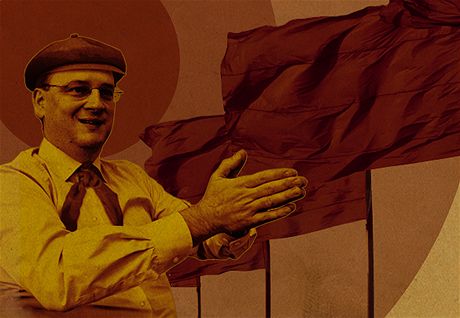
- Finally, in searching for the Ulbricht poem above I discovered that the Büstenhalter-Walter rhyme found another life in the best possible circumstances: the German version of Monty Python’s Lumberjack Song, in which it replaces “bra” and “papa”. Nice job here by Michael Palin.
Twenty Years Ago Today: Obituary for the Communist Party
A quick entry today which I should have posted a month ago. Czechs and Slovaks had fun with the collapse of Communist Party and one of the best relics preserved for me by my students was this obituary (in the style of Eastern European obituaries pasted on the wall). Interestingly the parodist was astute enough to bury the “leading role” of the party rather than the party itself which, in the form of the Communist Party of Bohemia and Moravia, still attracts a stable 1/6 of the popular vote but today has a leading role only in preventing coalitions and attracting disgruntled voters.
|
(Rough English translation) Who sets traps for others With pain in our hearts we announce to everyone the sad news that forever from us departed is the leading role of the Communist Party of Czechoslovakia
After 41 years of dissimulation, 29 December 1989 We part from our dearly departed “after free elections” In the name of the survivors And others closely related Milos Jakes |
|
(Original Czech-text form but without without diacritics) Kdo jinemu jamu kopa
S bolesti v srdci oznamujeme vsem smutnou zpravu, ze nas navzdy opustila nase vedouci uloha KSCOdesila po 41 letech disimulace 29. prosince 1989. S nasi drahou zesnulou se rozloucime po svobodnych volbach Jemenem pozustalych |
